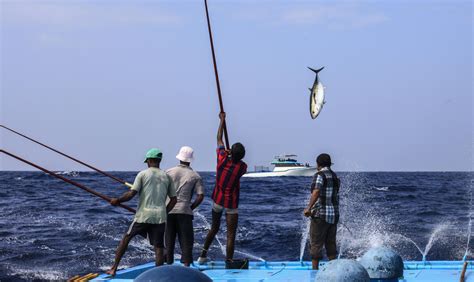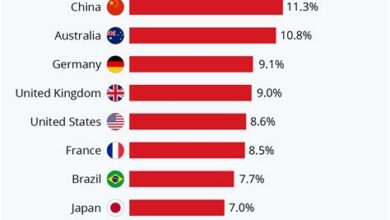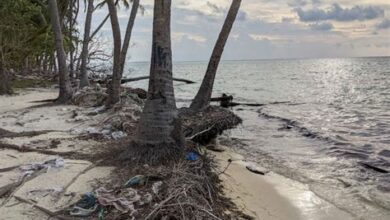Fisheries Sector in the Maldives: Latest Developments

Learn about sustainable fishing practices, technology in fishery management, challenges, climate change impact, and economic contributions of fisheries in this insightful blog post.The fisheries sector in the Maldives has long been a vital part of the country’s economy and culture. With its abundance of marine resources, the Maldives has been able to establish itself as a major player in the global seafood market. In this blog post, we will explore the latest developments in the Maldives’ fisheries sector, including sustainable fishing practices, the integration of technology in fishery management, the challenges facing the industry, the impact of climate change, and the economic contributions of the fisheries sector. As the Maldives continues to evolve, so does its approach to managing its marine resources. By examining these key areas, we can gain insight into how the fisheries sector is adapting to the changing environment and contributing to the overall well-being of the nation. Join us as we delve into the dynamic and constantly evolving world of fisheries in the Maldives.
Sustainable Fishing Practices
Sustainable Fishing Practices
In recent years, the Maldives has made significant advancements in promoting sustainable fishing practices to protect its marine resources. The government has implemented strict regulations and policies to ensure that fishing activities are carried out in an environmentally responsible manner.
One of the key initiatives in sustainable fishing is the introduction of marine protected areas, where fishing is restricted to allow marine life to thrive. This not only helps to maintain fish stocks, but also ensures the preservation of the delicate marine ecosystem.
Furthermore, the Maldives has also invested in promoting sustainable fishing methods such as pole-and-line fishing, which minimizes bycatch and reduces the impact on non-target species. These efforts have not only helped to conserve the marine environment, but also ensure the livelihood of local fisher communities.
Technology in Fishery Management
The use of technology in fishery management has revolutionized the way in which we approach the sustainable harvesting of marine resources. With the rapid advancement of tools such as GPS tracking, remote sensing, and underwater drones, fisheries managers are now able to monitor and regulate fishing activities more effectively than ever before. This not only helps in preventing overfishing, but also enables the protection of vulnerable marine ecosystems and species.
Moreover, the integration of technology in fishery management has also led to improved data collection and analysis. By employing advanced software and data processing tools, fisheries managers can now gather more accurate and detailed information regarding fish populations, stock assessments, and environmental factors. This allows for better-informed decision-making and policy development, ultimately leading to more sustainable fishing practices and resource conservation.
Furthermore, the adoption of technology in fishery management has streamlined the logistics and operational aspects of the fishing industry. From automated vessel monitoring systems to electronic reporting and digital catch documentation, technological innovations have significantly improved the efficiency and transparency of fishing operations. This not only benefits the industry by reducing administrative burden and compliance costs, but also enhances traceability and the ability to combat illegal, unreported, and unregulated (IUU) fishing activities.
Challenges in Fisheries Sector
In the fisheries sector of the Maldives, there are several challenges that are affecting the industry. One of the main challenges is the issue of overfishing. Due to the high demand for fish, there has been an increase in the number of fishing vessels and the use of unsustainable fishing practices, which has led to the depletion of fish stocks in the region.
Another challenge faced by the fisheries sector in the Maldives is the impact of climate change. The rise in sea temperatures and ocean acidification has resulted in the disruption of marine ecosystems, affecting the breeding and migration patterns of fish. This has further threatened the sustainability of fish stocks in the region.
Furthermore, the lack of proper management and regulation in the fisheries sector has also posed a significant challenge. This has led to the illegal, unreported, and unregulated (IUU) fishing activities, undermining the efforts to conserve fish stocks and protect the marine environment. Additionally, the inadequate infrastructure and technology for fishery management have hindered the monitoring and control of fishing activities, exacerbating the challenges faced by the sector.
Impact of Climate Change
Climate change has been having a profound effect on the world’s fisheries, including those in the Maldives. With the rise in sea temperatures, many fish species are migrating to cooler waters, disrupting the traditional patterns of fish stocks in the region. This has a significant impact on the fishing industry, as fishermen are forced to adapt to the changing environment and find new ways to catch their desired species.
Furthermore, climate change has also led to more extreme weather patterns, such as stronger and more frequent storms, which can be detrimental to fishing activities. This not only affects the catch of fish but also poses a safety risk for fishermen venturing out to sea. The rising sea levels and ocean acidification are also causing irreversible damage to marine ecosystems, further impacting the availability of fish for the fishing industry in the Maldives.
In order to mitigate the impact of climate change on the fisheries sector, it is crucial for the Maldives to invest in sustainable and resilient fishing practices. This includes implementing measures to conserve fish stocks, reducing carbon emissions, and promoting eco-friendly fishing methods. By taking these proactive steps, the Maldives can work towards preserving its valuable fisheries and the livelihoods of those who depend on them.
Economic Contributions of Fisheries
The economic contributions of the fisheries sector in the Maldives cannot be understated. As an archipelagic nation, the Maldives is heavily reliant on its marine resources for sustenance and economic stability. The fishing industry plays a pivotal role in the country’s economy, providing employment opportunities, food security, and export revenue.
With over 99% of the Maldives’ territory being water, the fisheries sector is a major contributor to the country’s gross domestic product (GDP). The export of fish and fish products accounts for a significant portion of the country’s foreign exchange earnings, further reinforcing the economic significance of the industry.
Moreover, the fisheries sector also supports ancillary industries such as boat building, ice production, and fish processing, creating additional economic value and employment opportunities. This sector not only contributes to the country’s economy but also plays a crucial role in the livelihoods of many Maldivians, particularly those living in rural and coastal areas.





